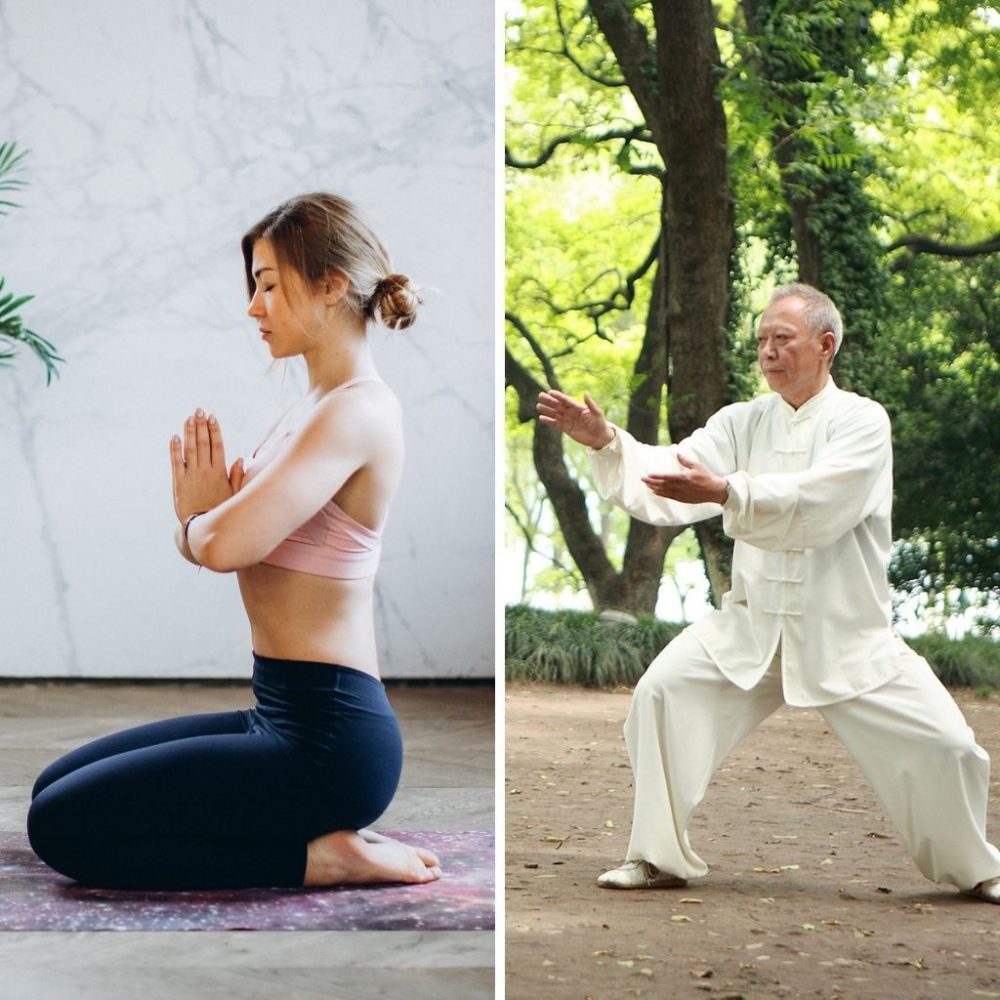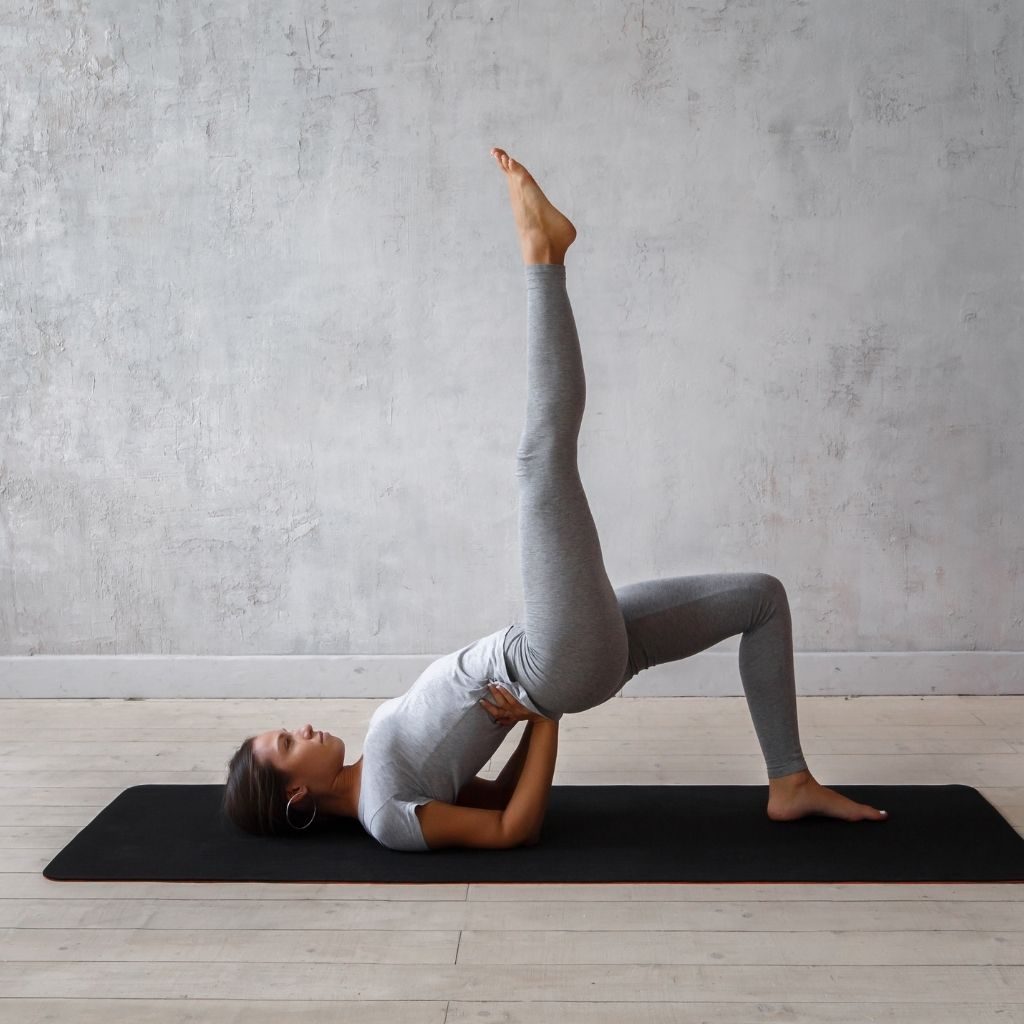Should I Do Yoga or Tai chi?
Yoga is in general terms a more common practice among women and Tai-chi among men.
Both offer great mental and physical benefits and can be practiced by people of any age and even with pre-existing health conditions.

Choosing between Yoga and Tai-chi boils down to your personal preference for physical activity.
Regular practice of either will help you strengthen your body, reduce muscle pain and improve your balance. But not only that, you will also increase flexibility, lose weight and improve your focus.
They both offer a mental discipline of self-cultivation that adds to the physical benefits of a regular practice.
A quick overview
Yoga is highly beneficial in many physical and mental health aspects, including reversing chronic illnesses such as diabetes.
Tai chi can boost brain power by increasing cognitive ability in addition to reducing anxiety levels.
The benefits of tai-chi have been demonstrated in a clinical study where groups of seniors were randomly assigned to take part in tai-chi or be an inactive control.
Over two years, the group who took Tai chi had improved cognitive ability and showed a 25% reduction in anxiety.
The benefits of yoga are also well documented, and include reducing pain, improving balance and flexibility, and even helping with weight loss.
Both yoga and tai-chi have a reputation for being challenging to the body, and the benefits accrued will depend on specific routines and practices.
This article will offer crucial insights on Yoga and Tai chi to help you choose the best practice according to your lifestyle.

Is Yoga or Tai-Chi Better For Balance?
A study found that in one week, Tai chi improved balance in a group of older adults better than another group that participated in a conventional exercise program that included aerobic and strengthening exercises.
Tai chi does not require many repetitions, does not require you to move your body in a particular way, and can be practiced in the comfort of your own home.
Yoga is a very flexible practice that anyone can perform at any age, however is can be more physically demanding than tai-chi and requires more movement of the body.
A study showed that it could help to improve balance and flexibility in seniors.
In the study, 29 seniors aged between 60 and 81 practiced yoga for ten weeks. Results showed that the group who took part in yoga had a significant improvement in balance, flexibility, and muscle strength compared to the control group.
Both of this options can be great ways to improve your balance while also boosting flexibility, and increasing muscle strength.
Is yoga or tai-chi better for anxiety?
Tai chi is better for treating anxiety when compared to yoga. This is because tai-chi is mainly a form of relaxation, often what people with anxiety need to do.
Tai chi has been shown to help with anxiety, depression, and stress in one study done on college students and adults.
They practiced tai-chi once daily for four weeks. The results showed that Tai chi helped ease depression and anxiety by diminishing symptoms associated with those disorders.
As a result, it has been used for decades to treat depression and other mental conditions such as anxiety.
A direct comparison between these two practices has not been documented yet.
Yoga has elements of both relaxation and strength training that can work together or independently depending on your needs.
Some research suggests that yoga’s ability to focus attention on the body can help calm the mind and reduce anxiety.

Is yoga or tai-chi better for seniors?
Tai chi is recommended for seniors looking to reduce lower body muscle pain and soreness—such as in the hips, knees, and ankles—and increase mobility and flexibility in bending and twisting joints (for example, wrists).
This is simply because Tai chi focuses on fluid, low-impact movements, which are easier to perform and can be sustained for more extended periods by seniors.
According to the National Center for Complementary and Alternative Medicine (NCCAM), senior participants in Tai chi found that they experienced less pain and stiffness in the joints.
Yoga is more beneficial for seniors who want to focus on improving their core abdominal strength and lower back pain. This is because yoga enhances the power of the abdominal and lower back muscles by mainly concentrating on poses that require abdominal work and maintaining balance.
A study found that seniors who practiced yoga regularly for eight weeks experienced an improved range of motion in their joints, which helped improve overall posture and physical function.
As with tai-chi, it has been shown that seniors who practice yoga regularly have less pain and stiffness in their joints and greater mobility.
Is yoga or tai-chi better for flexibility?
Tai chi is best for improving flexibility in seniors and individuals who like to move slowly and take their time to stretch their muscles in a relaxed state. This is because tai-chi exercises focus on slow movements and slower breathing to achieve deep relaxation.
By contrast, yoga is a better choice for fitter individuals and looking for a more physically intense routine. It is more strenuous and requires a great deal of concentration to do well.
Yoga’s flexibility comes from muscle strengthening exercises which would be difficult for seniors over 60 years old to perform.
This was proven in a study that compared seniors who took part in intermediate tai-chi and yoga.
Researchers found that seniors who practiced tai-chi regularly had a more significant improvement in their flexibility when compared to the group practicing yoga.
This was caused by the fact that more strenuous yoga poses required more effort to be practiced, and senior participants needed to take more breaks between poses due to the physical strain it caused.
A study was conducted on the effects of tai-chi on flexibility in seniors to test its possible benefits.
The study revealed that after 12 weeks of practicing tai-chi, participants demonstrated an increased range of motion that would help them perform daily activities and chores without experiencing pain or discomfort.

Is yoga or tai-chi better for weight loss?
Yoga is a better choice for weight loss compared to tai-chi because it is a physically intensive form of exercise that helps you increase your metabolic rate. This makes yoga an effective fat-burning workout.
On average, one yoga session may help an individual burn up to 500 calories, while a standard tai-chi practice may only burn up to 300 calories. However, it should be noted that not all yoga or tai-chi classes are the same, and some may be more physically active than others.
The ability of yoga to burn fat is backed by clinical research. An experiment was conducted to examine the effects of yoga on weight loss.
In the experiment, overweight women were assigned to one of two groups: one group took part in an aerobic exercise program, and the other group practiced yoga classes for 16 weeks.
The results showed that the participants who practiced yoga lost more weight than those who took part in an aerobic exercise program despite both groups being on a calorie-restricted diet.
In another study, it was revealed that people who practiced yoga on an almost daily basis had similar results to those who had participated in long-term weight loss programs.
This was because yoga helps to improve the body’s thermoregulation system and improves heart rate variability, which affects the body’s ability to burn fat.
On the other hand, Tai chi is not physically intensive enough to be considered a fat-burning workout. However, this does not mean that it cannot be used for weight loss.
According to the National Center for Complementary and Alternative Medicine, tai-chi can be a viable way to lose weight as long as you exercise daily for 30 minutes and follow a healthy diet that consists of low-calorie foods.
You may also like 👉 Yoga for Fat People: Can Overweight People Practice Ashtanga?
Are yoga and tai-chi compatible?
Yoga and Tai chi are compatible exercise forms. Many yoga and Tai chi practitioners use both methods to improve their physique further.
When combined, yoga and tai-chi will provide various benefits, including flexibility, strength, and energy.
They are less strenuous when done together, as proved by a study of experienced yoga and tai-chi practitioners.
Participants performed an intense yoga session before and after they took part in a 90-minute tai-chi class. It was noticed that the yoga participants experienced less thigh pain during their Tai chi workout.
It is also worth noting that both yoga and tai-chi borrow some exercise from each other such as the breathing techniques used in yoga and the standing poses of Tai chi. This means that you can easily incorporate both into your routine and reap the combined benefits.

You may also like 👉 Does Ashtanga Yoga Help You Lose Weight? Calories Burnt & Best Poses
Conclusion
Both yoga and tai-chi are beneficial forms of exercise when done with the proper guidance and instruction.
Both of them can be great ways to improve posture and flexibility, but their use can be better suited to different types of individuals based on their exercise preferences.
As always, consult with your doctor before starting any new exercise program to ensure that it is safe for you.
Read also:

